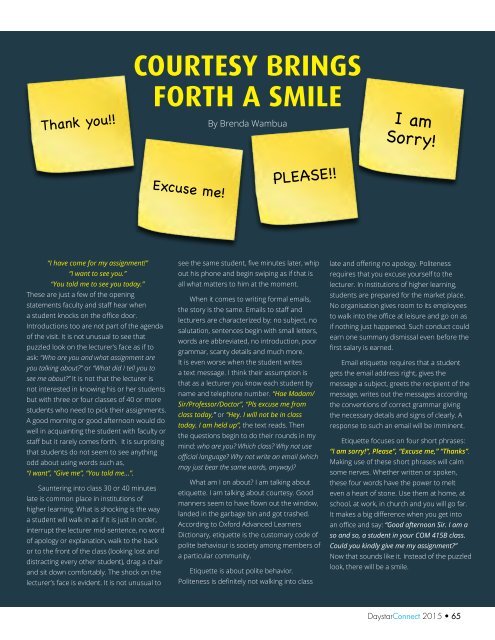our roots
Connect2015
Connect2015
You also want an ePaper? Increase the reach of your titles
YUMPU automatically turns print PDFs into web optimized ePapers that Google loves.
Thank you!!<br />
C<strong>our</strong>tesy brings<br />
forth a smile<br />
By Brenda Wambua<br />
I am<br />
Sorry!<br />
Excuse me!<br />
PLEASE!!<br />
“I have come for my assignment!”<br />
“I want to see you.”<br />
“You told me to see you today.”<br />
These are just a few of the opening<br />
statements faculty and staff hear when<br />
a student knocks on the office door.<br />
Introductions too are not part of the agenda<br />
of the visit. It is not unusual to see that<br />
puzzled look on the lecturer’s face as if to<br />
ask: “Who are you and what assignment are<br />
you talking about?” or “What did I tell you to<br />
see me about?” It is not that the lecturer is<br />
not interested in knowing his or her students<br />
but with three or f<strong>our</strong> classes of 40 or more<br />
students who need to pick their assignments.<br />
A good morning or good afternoon would do<br />
well in acquainting the student with faculty or<br />
staff but it rarely comes forth. It is surprising<br />
that students do not seem to see anything<br />
odd about using words such as,<br />
“I want”, “Give me”, “You told me…”.<br />
Sauntering into class 30 or 40 minutes<br />
late is common place in institutions of<br />
higher learning. What is shocking is the way<br />
a student will walk in as if it is just in order,<br />
interrupt the lecturer mid-sentence, no word<br />
of apology or explanation, walk to the back<br />
or to the front of the class (looking lost and<br />
distracting every other student), drag a chair<br />
and sit down comfortably. The shock on the<br />
lecturer’s face is evident. It is not unusual to<br />
see the same student, five minutes later, whip<br />
out his phone and begin swiping as if that is<br />
all what matters to him at the moment.<br />
When it comes to writing formal emails,<br />
the story is the same. Emails to staff and<br />
lecturers are characterized by: no subject, no<br />
salutation, sentences begin with small letters,<br />
words are abbreviated, no introduction, poor<br />
grammar, scanty details and much more.<br />
It is even worse when the student writes<br />
a text message. I think their assumption is<br />
that as a lecturer you know each student by<br />
name and telephone number. “Hae Madam/<br />
Sir/Professor/Doctor”, “Pls excuse me from<br />
class today,” or “Hey. I will not be in class<br />
today. I am held up”, the text reads. Then<br />
the questions begin to do their rounds in my<br />
mind: who are you? Which class? Why not use<br />
official language? Why not write an email (which<br />
may just bear the same words, anyway)?<br />
What am I on about? I am talking about<br />
etiquette. I am talking about c<strong>our</strong>tesy. Good<br />
manners seem to have flown out the window,<br />
landed in the garbage bin and got trashed.<br />
According to Oxford Advanced Learners<br />
Dictionary, etiquette is the customary code of<br />
polite behavi<strong>our</strong> is society among members of<br />
a particular community.<br />
Etiquette is about polite behavior.<br />
Politeness is definitely not walking into class<br />
late and offering no apology. Politeness<br />
requires that you excuse y<strong>our</strong>self to the<br />
lecturer. In institutions of higher learning,<br />
students are prepared for the market place.<br />
No organisation gives room to its employees<br />
to walk into the office at leisure and go on as<br />
if nothing just happened. Such conduct could<br />
earn one summary dismissal even before the<br />
first salary is earned.<br />
Email etiquette requires that a student<br />
gets the email address right, gives the<br />
message a subject, greets the recipient of the<br />
message, writes out the messages according<br />
the conventions of correct grammar giving<br />
the necessary details and signs of clearly. A<br />
response to such an email will be imminent.<br />
Etiquette focuses on f<strong>our</strong> short phrases:<br />
“I am sorry!”, Please”, “Excuse me,” “Thanks”.<br />
Making use of these short phrases will calm<br />
some nerves. Whether written or spoken,<br />
these f<strong>our</strong> words have the power to melt<br />
even a heart of stone. Use them at home, at<br />
school, at work, in church and you will go far.<br />
It makes a big difference when you get into<br />
an office and say: “Good afternoon Sir. I am a<br />
so and so, a student in y<strong>our</strong> COM 415B class.<br />
Could you kindly give me my assignment?”<br />
Now that sounds like it. Instead of the puzzled<br />
look, there will be a smile.<br />
DaystarConnect 2015 • 65


